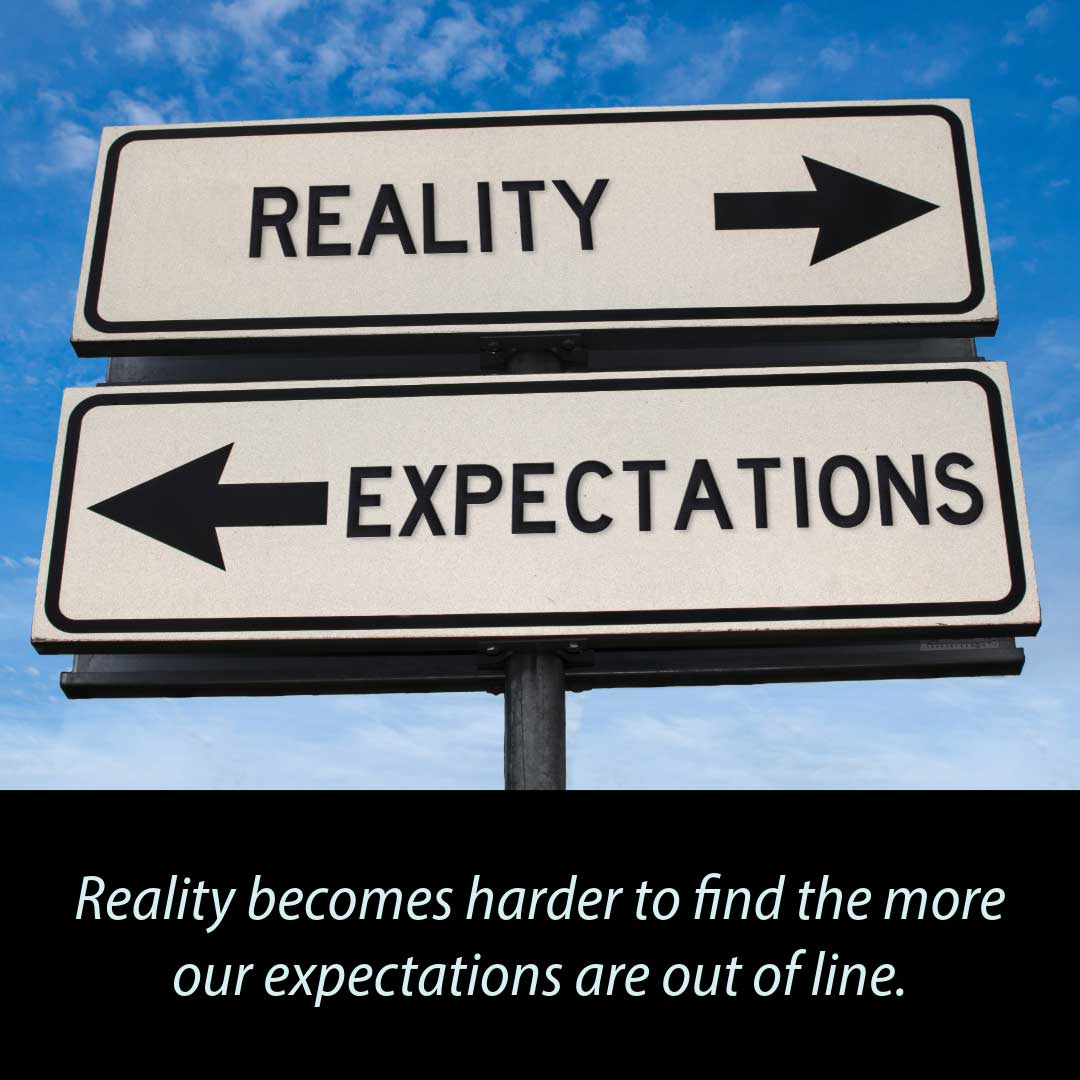Navigating the Gap Between Expectations and Reality

Have you ever considered the extent to which expectations, in a general sense, impact your life – your thoughts, emotions, mindset, behavior or relationships with others?
And by "expectations," I mean what you believe, hope, or assume will happen or be the case in the future, which include -
- Expectations of yourself
- Expectations of others
- Expectations for your work, career, marriage, family, social or spiritual life
What immediately comes to mind?
Would you categorize it as an expectation that has been exceeded, met, or fallen short?
Some might think of memorable accomplishments in the past that met or even exceeded their expectations - or maybe the present-day blessings or ongoing fulfillment from a thriving career, rock-solid marriage, close-knit family, loyal group of good friends, or unshakable, enduring faith.
However, my guess is that for many others, their mind goes straight to expectations that fell short – maybe woefully short.
Why?
Those occasions are likely seared into their memory - filled with disappointment, disillusionment, confusion and pain.
The culprit?
➢ Unrealistic expectations - which could fall within the realm of possibility but most often lead to unrealized expectations.
➢ Unfounded expectations - which are disconnected from reality or real-world circumstances, making them highly improbable or impossible to achieve.
For the record, I believe in the power of a positive mindset and expecting the best from ourselves and others. In contrast, a negative attitude or the presence of low expectations may imply a lack of confidence, fear of failure or unwarranted pessimism.
However, embracing a positive mindset solely rooted in overly optimistic or unrealistic expectations can eventually confront us with a cold, hard truth - reality becomes harder to find the more our expectations are out of line.
And the greater the gap between expectations and reality, the deeper the disappointment, disillusionment, confusion and pain.
"Manage your expectations, but always remain optimistic." –
Tony Dungy, Superbowl-winning coach, player and New York Times bestselling author
In coaching, I would likely pursue the following line of questions or exploration with a client when I sense the presence of unrealistic or unfounded expectations –
➢ What specific expectations might you have regarding (yourself, others, life) that might apply to this (situation or issue)?
➢ What beliefs (or assumptions) support your expectations? Examples might include -
- Your belief about, or in, yourself, your abilities, knowledge or experience.
- Your beliefs about, or in, someone else, such as a parent, spouse, sibling, friend, co-worker, boss, advisor, doctor, pastor, or God.
- Your beliefs about, or in, your employer, the organization you volunteer for, the companies you do business with, your church, or even our schools, universities, political parties, government, or the general population.
- Your beliefs about, or in, a product, service, process, system, training or education program.
➢ These beliefs or assumptions then need to be challenged -
- Truth – Is your belief grounded in objective fact, sound logic, or credible evidence, or is it imagined, invented, or biased?
- Trust – Is your belief instinctive, earned, or merited?
- Track Record – Is there a history of past performance or a trail of evidence to support your belief?
➢ Based on a scale from zero (unfounded) to ten (realistic), how would you rank each challenge to your belief or assumption?
➢ In what ways might your unfounded or unrealistic expectations require adjustment to make them more realistic?
This process can help identify both the presence of unrealistic or unfounded expectations and underlying reasons for a gap between expectations and reality while facilitating the adjustment of current expectations or the establishment of more realistic ones for the future.
"The pessimist complains about the wind; the optimist expects it to change; the realist adjusts the sails." -
William Arthur Ward, American motivational writer
So, what role does hope play in our expectations?
In a world full of uncertainties, hope is essential to life. Hope is future-focused and fuels our motivation, resiliency, psychological well-being, and, for many, our faith. Hebrews 6:19 (ICB) refers to hope "as an anchor for the soul, sure and strong."
But I also think our hopes, as they relate to expectations, require a foundational belief or faith in someone or something - otherwise, they lack substance.
Additionally, there are certain situations in life in which a person's faith or belief in someone or something can fill the gap between expectations and reality, such as –
- Someone who has faced adversity or major setbacks, hoping for a second chance or much-needed break in life.
- A young person seeking a position in a certain field or with a particular company, fueled by the hope of a promising career.
"All kids need is a little help, a little hope and somebody who believes in them." -
Magic Johnson, NBA legend
And at times, things might get blurred between hope and our beliefs -
- We may cling to hope for outcomes we find hard to believe in, such as recovery from severe illness or achievement of lofty goals.
- Conversely, we may maintain belief in something but lack hope, such as persisting in a failing marriage or grappling with crises of faith amidst life's trials.
When certainty is scarce and doubt inevitable, sometimes, when justified, we just need to have faith. And faith, while not visible or evident, can provide a tangible reality to our hopes, beliefs, and, ultimately, our expectations.
"Now faith is the substance of things hoped for, the evidence of things not seen." -
Hebrews 11:1 (KJV)
So, my suggested focus when navigating the gap between expectations and reality is to keep it real, keep it positive, and when hope is justified, keep the faith.